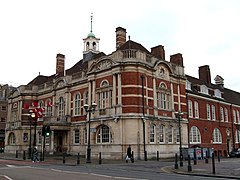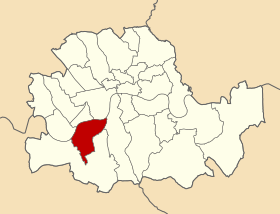Metropolitan Borough of Battersea
| Battersea St Mary |
|
|---|---|
 Former Battersea Town Hall (now Arts Centre) |
|
 Metropolitan Borough of Battersea shown within the County of London |
|
| Area | |
| • 1831 | 3,020 acres (12.2 km2) |
| • 1851 | 2,343 acres (9.48 km2) |
| • 1901 | 2,161 acres (8.75 km2) |
| Population | |
| • 1801 | 3,365 |
| • 1851 | 10,560 |
| • 1901 | 168,907 |
| Density | |
| • 1851 | 4.5/acre |
| • 1901 | 78/acre |
| History | |
| • Origin | Ancient parish |
| • Abolished | 1965 |
| • Succeeded by | London Borough of Wandsworth |
| Status |
Civil parish (until 1965) Metropolitan borough (1900—1965) |
| Government | Vestry of the Parish of Battersea (1888—1900) Battersea Borough Council (1900—1965) |
| • HQ | Municipal Buildings, Lavender Hill |
| • Motto | Non Mihi Non Tibi Sed Nobis (Not for me, not for thee, but for us) |
 Coat of arms of the borough council |
|
Battersea was a civil parish and metropolitan borough in the County of London, England. In 1965, the borough was abolished and its area combined with parts of the Metropolitan Borough of Wandsworth to form the London Borough of Wandsworth. The borough was administered from Battersea Town Hall on Lavender Hill and the building is now Battersea Arts Centre.
As an ancient parish, Battersea was part of the Hundred of Brixton and County of Surrey. It included the exclave of Penge.
In 1855, under the Metropolis Management Act 1855, the civil responsibilities of the parish were passed to the Metropolitan Board of Works. The two parts of the parish were assigned to different districts by the act establishing the MBW: Battersea was included in the area of the Wandsworth District Board of Works and the hamlet of Penge in that of Lewisham District Board of Works. Penge became a civil parish in its own right in 1866.
On 25 March 1888, a separate vestry was formed as a local authority for The parish of Saint Mary Battersea excluding Penge. In 1889, the Local Government Act 1888 reconstituted the area of the Metropolitan Board of Works as the County of London, and Battersea was transferred from Surrey to the new county.
The population of the parish in 1896 was 165,115 and it had adopted the Public Libraries Act 1850 immediately upon obtaining local independence in 1888, with its own vestry. For electoral purposes, the parish was divided into four wards and had 120 elected vestrymen.
...
Wikipedia
